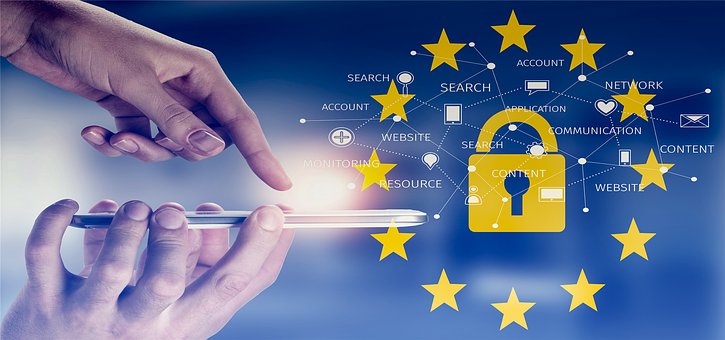GDPR + Marketing Automation Software = An Opportunity for Business Owners

With the May 25th deadline for the new GDPR requirements looming on the horizon, business owners need to be prepared to ensure compliance or face some hefty fines. We’ve already brought you news and information about GDPR, along with a handy GDPR checklist aimed at helping Ireland’s SMEs to prepare for the change in legislation. Today, we’re going to take a look at how harnessing the power of marketing automation can help to solve any GDPR problems in a simple and straightforward manner.
Until now, when planning an integrated marketing campaign, a marketer decides who they want to target, acquires the necessary data to do so and begins the campaign. Sourcing the correct data is essential for success and marketers have often turned to a data supplier to purchase the relevant records they have available on the target market group.
However, the new GDPR rules mean that purchasing data in this way will no longer be an option, you will need to gather your own data for use in marketing campaigns in future. GDPR has been designed to strengthen data protection legislation for EU citizens and unify legislation across all member states of the European Union.
When it comes to marketing, there are three main areas that marketers need to consider in order to comply with the new legislation:
ACCOUNTABILITY AND RESPONSIBILITY:
organisations are responsible for putting in place processes that adhere to the principles of GDPR – businesses will be held accountable for any breaches of the GDPR rules, with significant financial penalties for any breaches.
- Privacy by Design and by Default requires you to develop business processes considering data protection issues.
- A Data Protection Impact Assessment must be conducted in the event of any risk to the protection of personal data.

CONSENT:
- Organisations must be able to prove opt-in.
- Organisations must gain valid consent from individuals for their data to be collected and used for marketing purposes.
- Organisations must provide a process for individuals to withdraw consent at any time.

RIGHT TO BE FORGOTTEN:
individuals must have the right to request that all of their personal data held by an organisation be erased on a number of grounds of non-compliance. This is especially important if an organisation is discovered to be unlawfully using their personal data.
As GDPR comes into force, digital marketing is set to become the foundation upon which brand reputation and brand management rests. This may seem challenging for some business owners which is where marketing automation can come to the rescue. By using the right combination of marketing automation software and good management, businesses should be able to ensure that they are GDPR compliant, giving their customers the peace of mind that results from knowing that their data is being processed in a secure and responsible manner.
Take a look at the following three ways that marketing automation software can help your business to comply with the new data protection regulations:
- Total control – with all marketing and sales activities in one centralised dashboard. This will result in all of your marketing and sales activities being displayed in one convenient place, making it easier to maintain up to date and accurate data, as legally required by GDPR.
- Consent management – marketing automation software will allow businesses to manage consent to contact data subjects. Consent is recorded in a single customer-view of the data subject, displaying any cookie approvals, Do Not Track requests, etc., including the date on which this was provided, the campaigns under which it was provided and the policies attached to said campaigns, ensuring a full audit trial at every stage. It is essential that businesses can prove consent which provides a legal basis for data processing. In cases where consent is removed for specific processing activities, this will be tracked, enabling safeguards to be instigated to ensure that subjects cannot be contacted via a method for which they have removed consent.
- Standard template management – automation platforms enable businesses to create standard templates for privacy policies, cookie pop ups, T&C, customer profiling policies, etc. Using standardised templates will allow marketers and compliance managers to make sure that every marketing campaign has transparent notices in place and when data subjects interact with the campaign, the business will be able to tie their interaction to the policy being used for that specific campaign, ensuring a comprehensive audit trail at all times.
While the new data protection regulations represent good news for consumers, business owners and marketers may find the change a little intimidating as there is so much to learn and there are changes to be made within organisations and their processes. Complying with GDPR should be seen as an opportunity to build trust and improve customer engagement, issues that will benefit businesses in the long term.
However, many SME owners and managers are feeling trepidation as the GDPR deadline approaches, wondering if they are fully prepared for the change. This can cause stress and worry, distracting business owners from what they do best – running their business. Preparing for GDPR and ensuring compliance takes time and effort as there are so many issues involved.
If you’re a small to medium business owner who’s not sure about what you need to do to comply, or if you don’t have the necessary time to devote to making the changes that you need in order to comply, then a digital marketing agency can take the burden off your shoulders. You will be free to carry on running your business while the agency takes care of all of the issues involved when it comes to ensuring that your business is prepared to comply with the new legislation. A digital marketing agency will already have the knowledge and expertise necessary to look at your business processes and let you know what changes need to be made to ensure that you’re fully GDPR-compliant by May 25th.
Marketing automation software is already a powerful tool for marketers, enabling them to track leads, accurately measure ROI and gain a comprehensive insight into the customer lifecycle. The implementation of GDPR means that marketing automation platforms are becoming an essential tool for business owners as they enable you to track and verify that all data is managed in a GDPR compliant way.
Here at Emarkable, we’ve chosen SharpSpring as the marketing automation software we use on behalf of our clients. SharpSpring’s Privacy Policy has been updated to ensure compliance with GDPR and the SharpSpring software that we use here at Emarkable has built-in features that will help to ensure that clients manage their customer data in compliance with the new regulations. In fact, SharpSpring has new functionality to make compliance with GDPR easier, including:
- A new Privacy Policy.
- New form tools to help customers prove consent.
- An enhanced audit trail for events which transparently demonstrate how customer data is transferred, updated, accessed and deleted.
- A stringent identification verification process.
- A new “Cookie Disclosure” element showing what cookies are being used and for what purpose.
- More export and reporting options.
Don’t risk your business by falling foul of the new GDPR regulations, we have all the knowledge and tools necessary for your company to comply. Get in touch now and one of our expert marketing professionals can advise you on how you can ensure compliance with the new rules, ensuring success for your business in the coming months.





